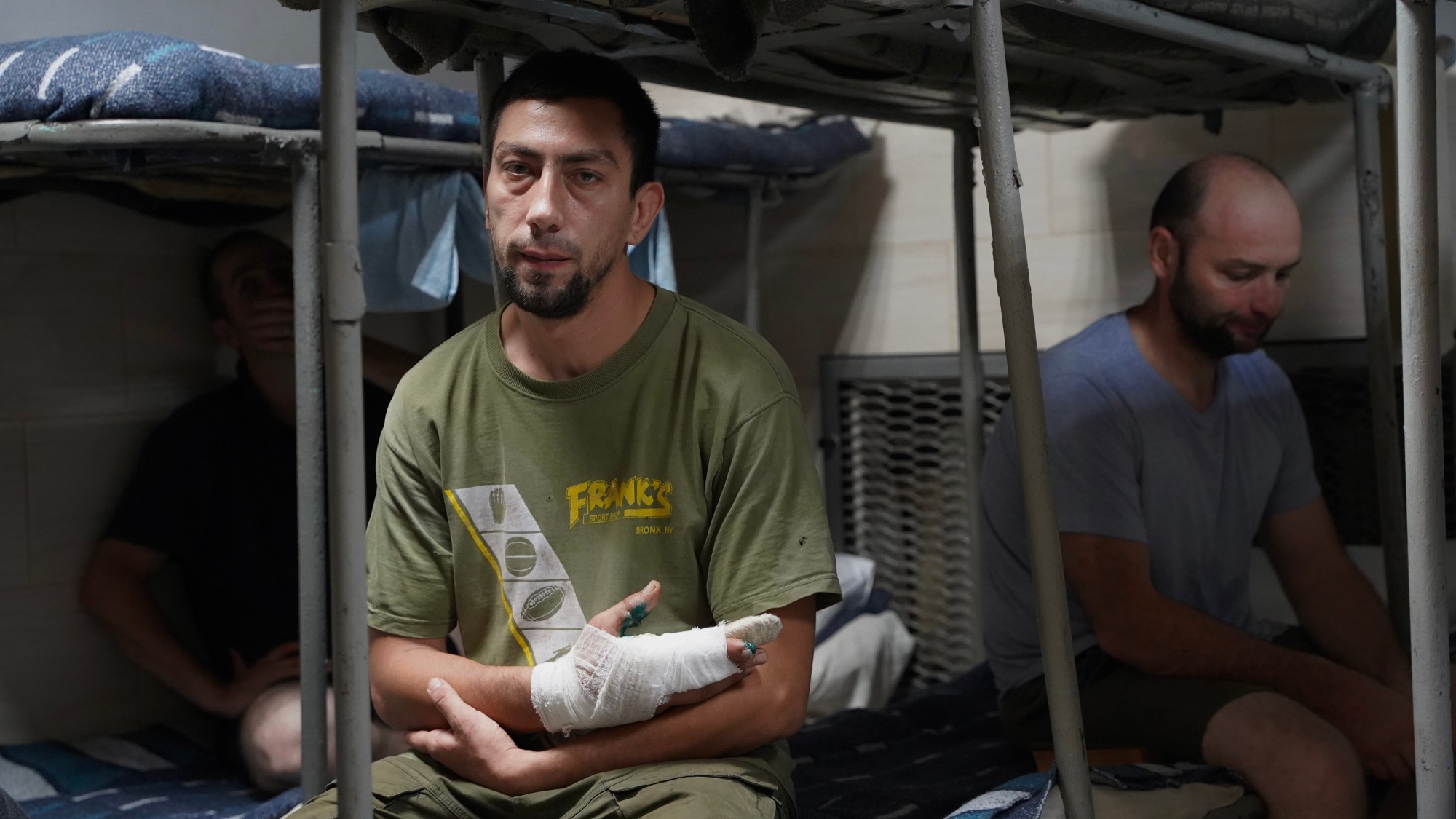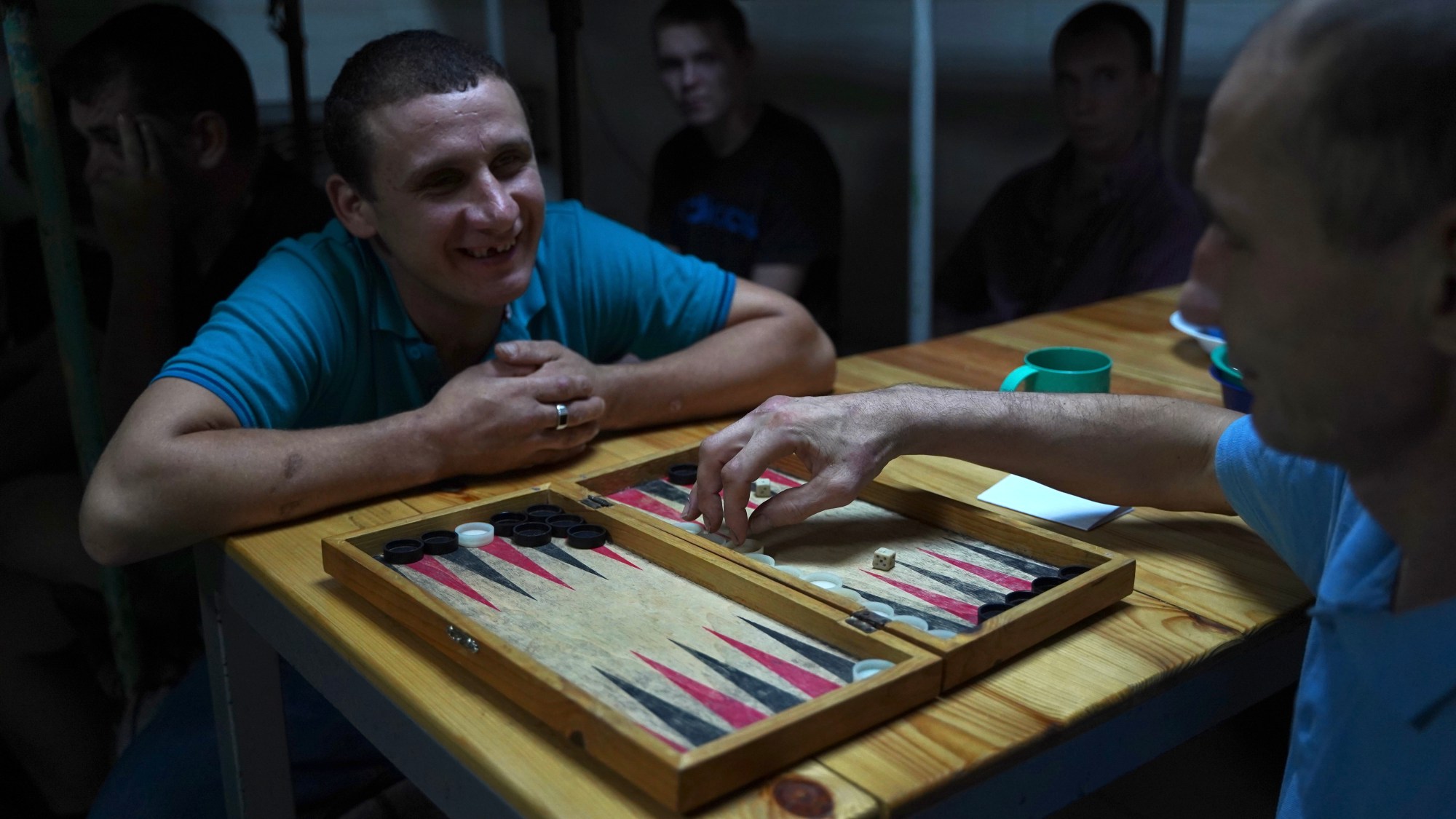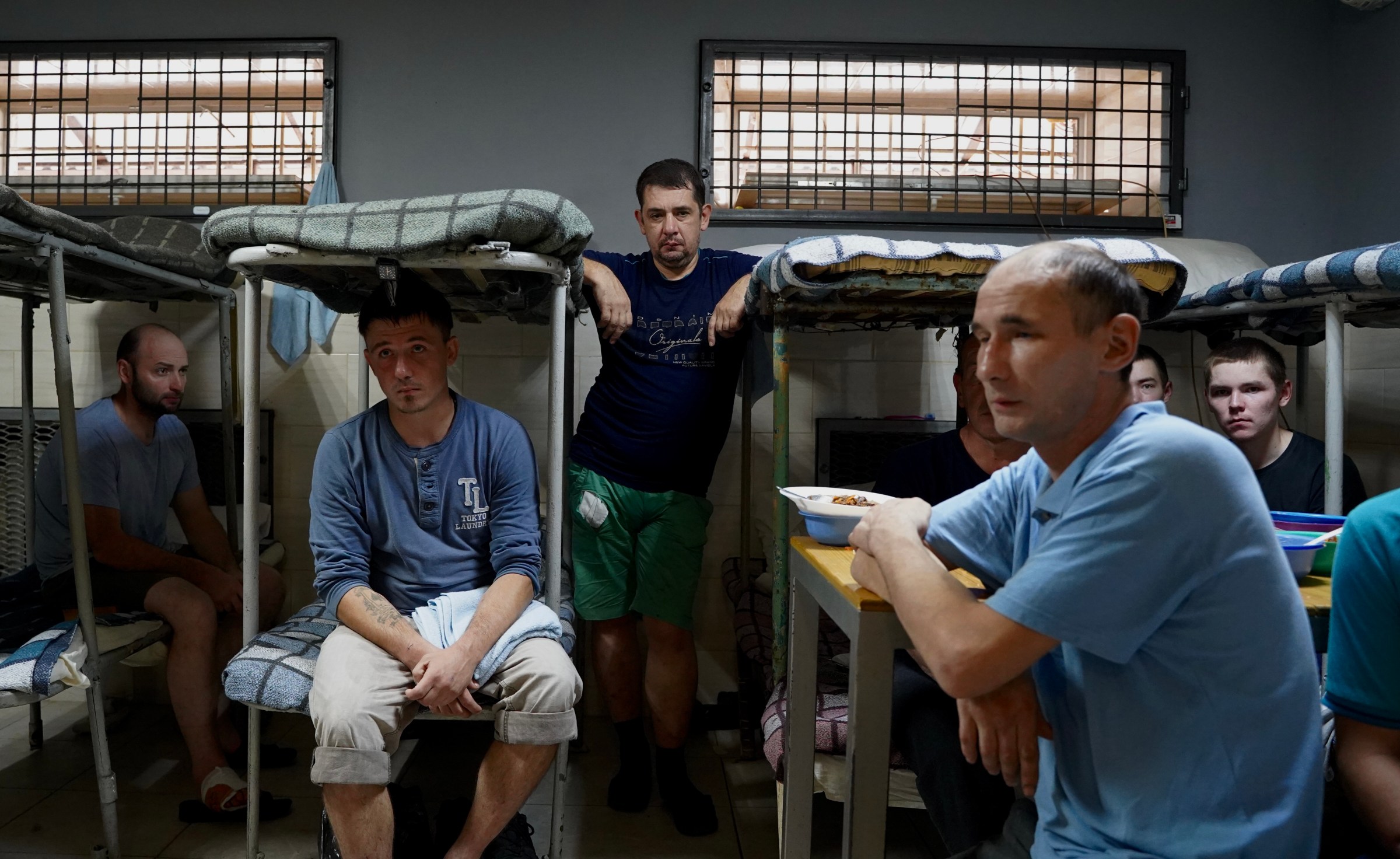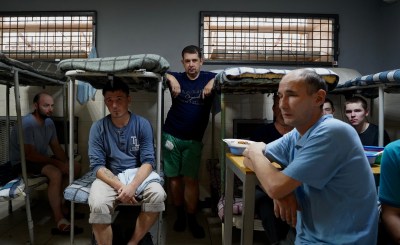NORTHERN UKRAINE—A powerful smell of cigarettes and sweat, mingled with the odors of a school cafeteria, overwhelms the corridor as a Ukrainian guard escorts us through the prison.
A little further on, a guard with a Cossack mustache escorts a Russian prisoner of war. The prisoner wears pants too big for him, and his face is tired. His arm is wrapped in a bandage stained with blood and yellow fluids, topped with an iron bar inserted directly into the bone, holding his fracture in place.
"We're taking him to the infirmary," the guard said.
Another guard, with a smooth turn of the key, unlocks the massive green iron door and escorts my translator and me into the room. Behind it, a dozen Russian prisoners of war are crammed together. (In return for access to the prison, we agreed not to disclose its precise location. The prisoners we met agreed to the interviews and acquiesced to being photographed.)
All were captured by Ukrainian forces during their offensive in the Kursk oblast in early August. Since then, the flow of Russian prisoners hasn’t stopped and could reach several thousand, according to one of the Ukrainian guards.

Askerkhan, a 30-year-old prisoner, steps forward. His face, dotted with a small black beard, is emaciated. His hand, wrapped in a bandage, is injured. "A bullet broke my finger."
Three months into his contract military service, Askerkhan and his unit were ambushed by the Ukrainian army. He is one of the few survivors.
"The conscripts surrendered as soon as the first shots were fired," Askerkhan explains with a shrug. "Those from the marine units who tried to resist were crushed."
Disillusioned, Askerkhan even dares to criticize his superiors: "Why did they only send conscripts to defend the border?"
The inmates sit around a small table with a television on it, and eat a mixture of porridge and stew from plastic bowls, accompanied by a cucumber salad roughly chopped with dill.
The wounded, lying on their bunks, stare blankly at the ceiling of their cell, blowing away flies that land on their faces.
Other prisoners, in a corner, play a game of backgammon and, in the stifling summer heat, enjoy a moment of relaxation with smiles on their faces. They know they will soon be exchanged.
Ukrainian President Volodymyr Zelensky has said that one of the reasons for the offensive was also to capture Russian prisoners to fill their "exchange fund.” On August 24, one day after our visit, Ukraine and Russia completed a prisoner exchange of 230 soldiers, 115 for each side. It’s unlikely any of the men we spoke to were included in that exchange.
Respect for the Geneva Conventions.
A 19-year-old conscript who asked to be called Rustam (not his real name), had only three months left before finishing his military service. Stationed in the region since mid-April, Rustam is one of the hundreds of conscripts captured during the offensive.
Without proper equipment or experience, many surrendered as soon as the fighting began.
"Our superiors sent us [to Kursk] telling us that [the Ukrainians] were gathering their troops at our border. But once we got there, no one gave us any orders," he explained.
Rustam, who’s from Dagestan in the Caucasus region, recounted the first days of the offensive.
"We were driving and driving [to another position], and then a drone hovered above us. It exploded, and that’s it—the shrapnel hit my finger," said Rustam, who has a thick bandage with a splint on his left hand. "We were then captured by the Ukrainians."
Andrey, a 31-year-old contract soldier, didn’t have time to understand what was happening to him. "I signed a contract on July 23 and was captured on August 7," he explained, almost with despair.
Surprised by the Ukrainian offensive, Andrey explains that he did everything to stop the advance.
"We came under Ukrainian fire during our retreat. Almost our entire unit was decimated. Those who survived were captured. As they say, you can’t stop a tank with a machine gun."

Conscripted directly after finishing his studies, 22-year-old Yevgeniy said he was surprised by the Ukrainian advance and admits, after a pause, that he never supported the war.
Today, all seem to be biding their time, hoping to be freed soon. Yevgeniy, upon his release, said he planned to resume his studies. "I’d like to study languages. Maybe English."
Rustam is more evasive. He hopes to return home to Dagestan and resume his job as a mechanic.
Andrey explains that since his arrival, he and his comrades have been well treated.
"Our officers said that if we were captured, we would be tortured," added Rustam, who, in an almost inaudible voice, admitted he never believed them.
"We expected a different reception, but we received normal humane treatment," continued Andrey. "We are fed and receive all the necessities of daily life. We are treated like human beings, even though we are prisoners."
Red Cross personnel came by last week, and Andrey and other inmates were able to write letters to their families in Russia.
Rustam, having arrived recently, hasn’t had the opportunity to do so yet.
With a strained expression, an officer of the Ukrainian Armed Forces in charge of moving POWs explained that Ukrainian prison staff strictly adhere to the Geneva Conventions.
But between two hallways, he confided his frustration. "They are our enemies, above all, and what we do for them is already too much. I can assure you it’s no pleasure taking them to the hospital and caring for them."
Many of them, the guard explained, were in a pitiful state when they were found. "I’ve heard that some were abandoned by their commander and went more than three days without eating. Here, as soon as they arrive, they are immediately taken care of, fed, and treated."
Askerkhan, under the watchful eyes of the guards, wanted to thank the Ukrainian combat medics.
"They didn’t differentiate between us and their own," he explained. "Here, no one threatens us, and we are well treated, whether by the guards or the doctors. I wish our soldiers treated Ukrainian prisoners of war the same way we are treated."
Iryna Matviyishyn contributed to the reporting.






Please note that we at The Dispatch hold ourselves, our work, and our commenters to a higher standard than other places on the internet. We welcome comments that foster genuine debate or discussion—including comments critical of us or our work—but responses that include ad hominem attacks on fellow Dispatch members or are intended to stoke fear and anger may be moderated.
With your membership, you only have the ability to comment on The Morning Dispatch articles. Consider upgrading to join the conversation everywhere.